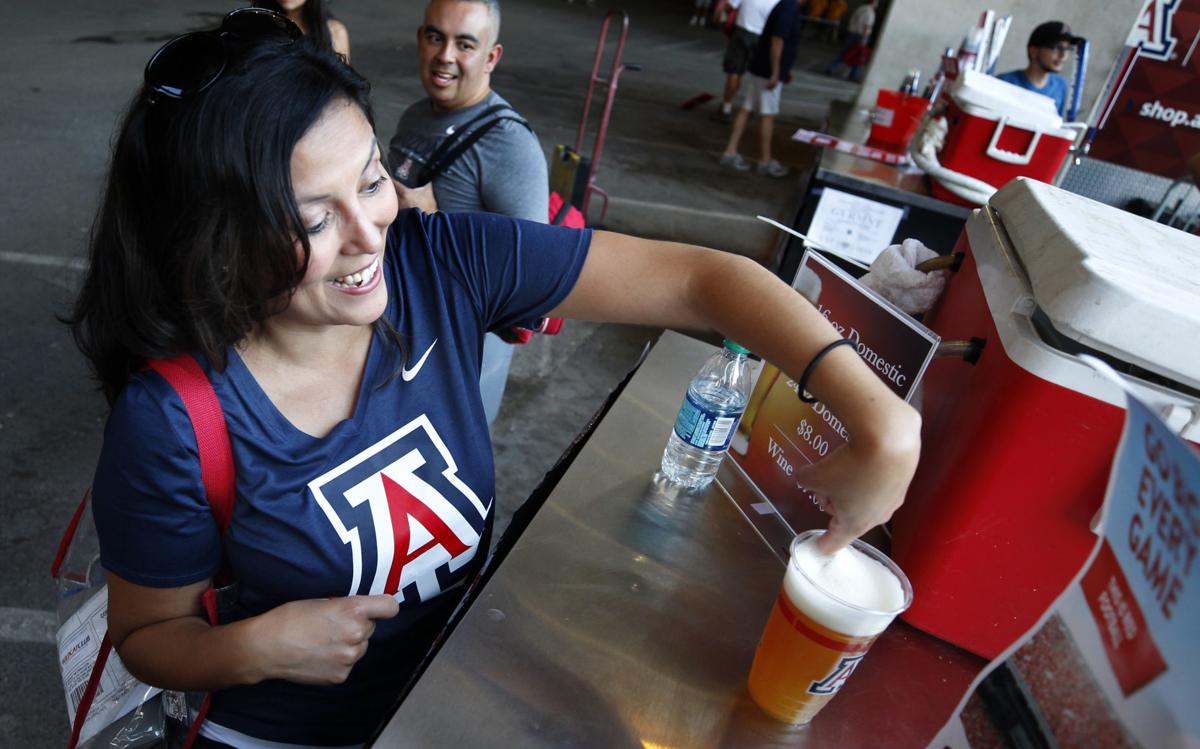The introduction of beer and wine sales at Arizona football and basketball games last season didn’t have the chaotic effect that some fans and critics initially feared.
No fights were recorded at McKale Center during the 2018-19 men’s basketball season, and ejections dropped by more than 50 percent from the previous year. While there were twice as many ejections during the 2018 football season as the season before, the number was still much lower than in previous years.
“We’ve been very pleased with the rollout across the board in Arizona Stadium and McKale,” UA athletic director Dave Heeke said. “This was really focused around a number of things that we’ve done in the area of fan amenities and food service, and beverage selection was a key component.”
Beer and wine sales came at the request of fans, Heeke said. The AD said fans had been requesting changes — which includes more food options — for years.
The new food-service areas and beer-serving stations led to additional costs to the school, Heeke said. The UA hired more security guards and ensured that drinks were poured by professional bartenders. The revenue from beer and wine sales and additional food options covered the cost, which Heeke said “wasn’t huge.”
Heeke said he hoped the added options would “enhance the environment” at games. UA officials have worked to combat dwindling attendance at UA football games, in part because of the late start times associated with TV broadcasts and some of the Wildcats’ on-field struggles.
“The alcohol sales have always been about doing it in a responsible and safe manner, and I think we’ve worked really hard to do that,” Heeke said.
The Tucson City Council approved the sale of beer and wine at McKale Center in December 2017, with a plan put in place to begin selling the following month.
But a complaint filed with the Arizona State Liquor Board shortly after the council’s vote stalled the plan until the board could meet to hold a hearing in March 2018. The complainant said beer and wine sales would lead to more crime on campus and increased DUIs.
He did not attend the following meeting, and the board unanimously approved the liquor license for McKale. UA officials assured the board that they had traffic-control measures in place and other precautions set to make sure alcohol was handled responsibly. Vendors at McKale sell beer from the time the arena opens until the after the first television timeout of the second half.
Arizona Stadium already held a liquor license, and the previous Arizona Bowls had sold beer and wine. The Wildcats’ Sept. 1 season opener against BYU marked the first time beer and wine had been sold to the general public at UA football games. Sales began 90 minutes before kickoff and stopped at the end of the third quarter.
During the 2018 season, 43 people were ejected from football games at Arizona Stadium, up from 21 the year before, the data shows. Beer and wine sales may not be to blame, at least not entirely: There were 72 ejections in 2014, 36 in 2015 and 69 in 2016. The seasons that showed a spike in ejections and fights — 2014, 2016 and 2018 — were all seasons in which the Wildcats played rival Arizona State at home, although it’s unclear how many occurred during the Territorial Cup games.
Attendance at Arizona Stadium was up in 2018, with an average of 45,436 fans per game watching the Wildcats. The 2017 attendance averaged 42,632.
McKale attendance dropped, likely as a result of one of Arizona’s worst seasons in decades. An average of 13,744 fans per game watched the Wildcats last season, down from 14,434 in 2017-18.
Just four fans were ejected from last season’s games, down from 13 the previous year. In fact, the four ejections represented a five-year low.
From the University of Arizona Police Department’s perspective, the game-day experience hasn’t really changed as a result of introducing beer and wine to the venues, said Sgt. Sean Shields, a UAPD spokesman.
UA police worked with the athletic department prior to the implementation of sales to discuss security and associated concerns, Shields said.
“I really haven’t noticed an increase in any type of criminal behavior due to beer and wine sales,” Shields said.
“Obviously from year to year the ejections and different numbers change and they fluctuate, but it’s very hard to pinpoint the reason why those happen.”
It’s difficult to associate criminal activity with alcohol sales at the venues, since many people tailgate and drink before coming to the games, Shields said.
UA police want to remind fans that if they’re going to drink, do it responsibly and to subscribe to the adage of “see something, say something,” including suspicious behavior or medical issues.
Heeke said he is encouraged by the increased attendance at football games and said the UA will continue to look for ways to engage fans and improve the game-day experience.
“I think it speaks well for our football program and the way people feel about that, but also some of the changes,” Heeke said, adding that the UA is looking into improvements on the stadium’s west concourse, since concessions and food service on that side are fairly limited.
“We want to do some of the things we rolled out last year with different food options, bringing vendors in from the community and really look how we can grow those, centered around some of the changes that were well received.”





